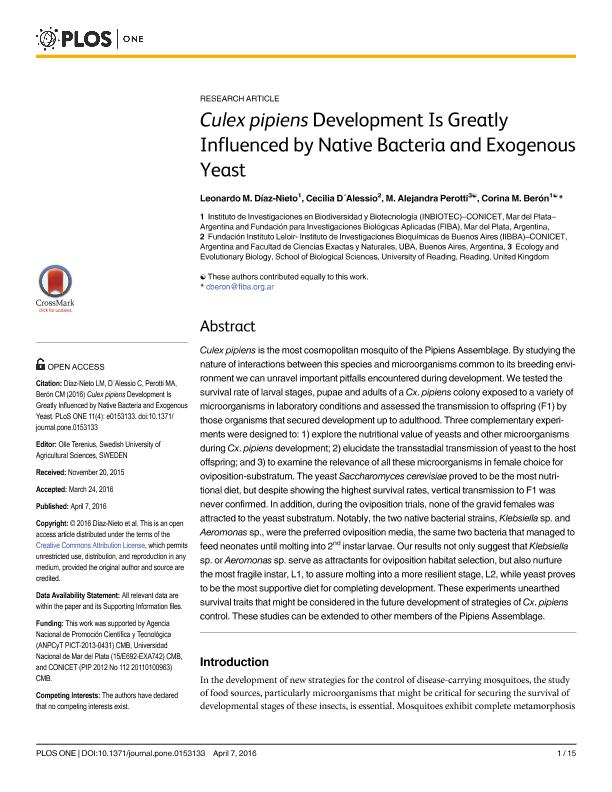Mostrar el registro sencillo del ítem
dc.contributor.author
Díaz Nieto, Leonardo Martín

dc.contributor.author
D'alessio, Cecilia

dc.contributor.author
Perotti, Maria Alejandra

dc.contributor.author
Berón, Corina Marta

dc.date.available
2017-09-12T14:35:49Z
dc.date.issued
2016-04
dc.identifier.citation
Díaz Nieto, Leonardo Martín; D'alessio, Cecilia; Perotti, Maria Alejandra; Berón, Corina Marta; Culex pipiens development is greatly influenced by native bacteria and exogenous yeast; Public Library of Science; Plos One; 11; 4; 4-2016; 1-15; e0153133
dc.identifier.issn
1932-6203
dc.identifier.uri
http://hdl.handle.net/11336/23979
dc.description.abstract
Culex pipiens is the most cosmopolitan mosquito of the Pipiens Assemblage. By studying the nature of interactions between this species and microorganisms common to its breeding environment we can unravel important pitfalls encountered during development. We tested the survival rate of larval stages, pupae and adults of a Cx. pipiens colony exposed to a variety of microorganisms in laboratory conditions and assessed the transmission to offspring (F1) by those organisms that secured development up to adulthood. Three complementary experiments were designed to: 1) explore the nutritional value of yeasts and other microorganisms during Cx. pipiens development; 2) elucidate the transstadial transmission of yeast to the host offspring; and 3) to examine the relevance of all these microorganisms in female choice for oviposition- substratum. The yeast Saccharomyces cerevisiae proved to be the most nutritional diet, but despite showing the highest survival rates, vertical transmission to F1 was never confirmed. In addition, during the oviposition trials, none of the gravid females was attracted to the yeast substratum. Notably, the two native bacterial strains, Klebsiella sp. and Aeromonas sp., were the preferred oviposition media, the same two bacteria that managed to feed neonates until molting into 2nd instar larvae. Our results not only suggest that Klebsiella sp. or Aeromonas sp. serve as attractants for oviposition habitat selection, but also nurture the most fragile instar, L1, to assure molting into a more resilient stage, L2, while yeast proves to be the most supportive diet for completing development. These experiments unearthed survival traits that might be considered in the future development of strategies of Cx. pipiens control. These studies can be extended to other members of the Pipiens Assemblage.
dc.format
application/pdf
dc.language.iso
eng
dc.publisher
Public Library of Science

dc.rights
info:eu-repo/semantics/openAccess
dc.rights.uri
https://creativecommons.org/licenses/by-nc-sa/2.5/ar/
dc.subject
Culex Pipiens
dc.subject
Native Bacteria
dc.subject
Exogenous Yeast
dc.subject
Development
dc.subject.classification
Bioquímica y Biología Molecular

dc.subject.classification
Ciencias Biológicas

dc.subject.classification
CIENCIAS NATURALES Y EXACTAS

dc.title
Culex pipiens development is greatly influenced by native bacteria and exogenous yeast
dc.type
info:eu-repo/semantics/article
dc.type
info:ar-repo/semantics/artículo
dc.type
info:eu-repo/semantics/publishedVersion
dc.date.updated
2017-07-27T12:34:42Z
dc.journal.volume
11
dc.journal.number
4
dc.journal.pagination
1-15; e0153133
dc.journal.pais
Estados Unidos

dc.journal.ciudad
San Francisco
dc.description.fil
Fil: Díaz Nieto, Leonardo Martín. Consejo Nacional de Investigaciones Científicas y Técnicas. Centro Científico Tecnológico Conicet - Mar del Plata. Instituto de Investigaciones En Biodiversidad y Biotecnología; Argentina. Fundación para Investigaciones Biológicas Aplicadas; Argentina
dc.description.fil
Fil: D'alessio, Cecilia. Consejo Nacional de Investigaciones Científicas y Técnicas. Oficina de Coordinación Administrativa Parque Centenario. Instituto de Investigaciones Bioquímicas de Buenos Aires. Fundación Instituto Leloir. Instituto de Investigaciones Bioquímicas de Buenos Aires; Argentina
dc.description.fil
Fil: Perotti, Maria Alejandra. University Of Reading; Reino Unido
dc.description.fil
Fil: Berón, Corina Marta. Consejo Nacional de Investigaciones Científicas y Técnicas. Centro Científico Tecnológico Conicet - Mar del Plata. Instituto de Investigaciones En Biodiversidad y Biotecnología; Argentina. Fundación para Investigaciones Biológicas Aplicadas; Argentina
dc.journal.title
Plos One

dc.relation.alternativeid
info:eu-repo/semantics/altIdentifier/doi/http://dx.doi.org/10.1371/journal.pone.0153133
dc.relation.alternativeid
info:eu-repo/semantics/altIdentifier/url/http://journals.plos.org/plosone/article?id=10.1371/journal.pone.0153133
Archivos asociados
